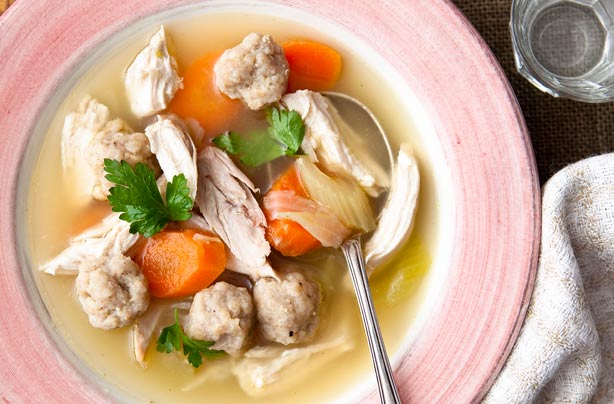Old wives' tales - fact or fiction?
Can chicken soup really beat a cold? We've investigated some of the old wives tales that have been handed down over the years and give you all the facts


Can an apple a day really keep the doctor away? We've taken ten of the most popular old wives' remedies regarding our health and looked to see if there's any truth in the ol' saying. With a little help from the lovely Dr Chris Steele for his expert opinion...
1. Eat chicken soup to beat a cold
In 2000, an American chest-doctor published research that found chicken soup really does contain health-giving properties. He said it stimulates immune cells that then help reduce swelling in the throat and stop your nose running. And good news for vegetarians - the vegetables used in the soup, such as onions, turnips and carrots also had some of the same qualities.
Dr Chris' verdict: I travelled round the country investigating old wives' tales and this was the one I was most impressed by. The way Jewish mothers especially cook this really does provide health-boosting properties.
2. Carrots help you see in the dark
This tall story comes from WW2, when the British military pretended RAF pilots were eating carrots to help them see, rather than reveal to the Germans they had developed a radar to pinpoint enemy planes.
However, researchers in Holland have discovered that eating a lot of beta-carotene, which is what gives carrots their colour, can help stop your eyesight getting worse, as you get older by up to 35%. Other sources of beta-carotene are sweet potatoes, pumpkins and spinach.
Dr Chris' verdict: Yes, beta-carotene does actually help your vision and stops it getting worse as you get older. There's no real basis for it helping you see in the dark, though.
3. Feed a cold, starve a fever
Most doctors and nutritionists have said that this is total rubbish for years because no matter how you're feeling, you should try to get liquids and a little food inside you to keep your energy levels up.
Parenting advice, hot topics, best buys and family finance tips delivered straight to your inbox.
However, Dutch scientists discovered that eating a meal boosts your immune system and can help destroy viruses responsible for your cold. They also found that drinking just water increased the levels of a chemical in the body that helped attack fever-like symptoms.
Dr Chris' verdict: This is rubbish really. There's no real scientific evidence for this. Whether you have a cold or a fever, you need as much nutrition as possible and to drink plenty of fluids.
4. Eating oranges stops you getting colds
Everyone knows that getting a dose of vitamin C helps wards off snuffles, don't they? Well, although eating oranges is good for you, according to research by the Australian National University and the University of Helsinki, there is no evidence that vitamin C can directly fight a cold.
Dr Chris' verdict: While there's not much evidence to suggest that vitamin C will do anything, eating oranges will count as one of your daily portions of fruit and veg, which is vital for keeping your immune system going.
5. Don't go out with wet hair
A true classic - if you go outside without using the hair dryer, you'll catch a cold, especially during winter. This appears to be so far from the truth, we think it was made up entirely by mums who wanted their kids to dry their hair properly.
Dr Chris' verdict: A load of rubbish - there's no scientific basis for this having any bad or good effect on you.
6. Wrap a bruise in brown paper
There are a lot of home remedies that involve spreading goose fat, molasses or mustard on brown paper and then wrapping this around your bruise or other affected area. Unsurprisingly, there is no scientific proof that it works!
Dr Chris' verdict: Again, there's no evidence that proves that this will work. However, what you can't forget are the psychological benefits that something as simple as this can have. If someone believes it will work, it can often help a person get over something more quickly, even though it's having no medical effect.
7. An apple a day keeps the doctor away
Well, eating a Granny Smith every day might not cure everything, but scientists have discovered that apples are pretty impressive fruits.
They contain something called quercetin that has been found to help both lung and prostate cancer, as well as lower the likelihood of heart disease.
And that's not all - research has discovered that apples can help fight Alzheimer's and breast cancer.
Dr Chris' verdict: This is sound advice - apples contain vitamin C, fibre and antioxidants which will all help you fight off illness. An apple also counts as one of your five portions of fruit and veg a day.
8. Honey helps a sore throat
We must all have been given hot water with honey and lemon at some point and new research proves that it's not such a bad idea. A new US study says that honey at bedtime reduces coughs and sore throats better than many normal medicines and also helps children sleep.
Dr Chris' verdict: This is especially good for young children, who shouldn't really take over-the-counter medicines
9. Eating greens will make your hair curly
Have you ever told your kids to eat up their cabbage and spinach to help their hair go curly? Sadly, there's no scientific evidence that your locks will suddenly look more glossy after a portion of greens.
Dr Chris' verdict: It's no surprise that parents say this to their kids. We are very bad at eating greens - and the deep-coloured vegetables, like cabbage, spinach and broccoli are the best to eat. They're a great source of antioxidants, which protect against heart disease, cancer and other illnesses.
10. Wrap up to avoid a cold
How many times did your mum tell you to make sure you wore a coat and scarf to stop you getting a cold? Well, for years scientists couldn't find any proof to back this up. Then recently, a study at Cardiff University showed that cold feet can lead to increased risk of catching a cold.
Dr Chris' verdict: There's some proof as to why we get more colds in winter. Professor Eccles from The Cold & Flu Research Centre says that it's because cold air narrows the lining of your nose. This stops as many white cells flowing round your body that normally help your immune system.
Where to next?
- Still suffering with a cold? Try these natural remedies to beat the snuffles - Things everyone should keep in their medicine cabinet - Get more great advice from Dr Chris at FamilyGP.com

Jessica Dady is Food Editor at GoodtoKnow and has over 12 years of experience as a digital editor, specialising in all things food, recipes, and SEO. From the must-buy seasonal food hampers and advent calendars for Christmas to the family-friendly air fryers that’ll make dinner time a breeze, Jessica loves trying and testing various food products to find the best of the best for the busy parents among us. Over the years of working with GoodtoKnow, Jessica has had the privilege of working alongside Future’s Test Kitchen to create exclusive videos - as well as writing, testing, and shooting her own recipes. When she’s not embracing the great outdoors with her family at the weekends, Jessica enjoys baking up a storm in the kitchen with her favourite bakes being chocolate chip cookies, cupcakes, and a tray of gooey chocolate brownies.